Bài giảng môn Tiếng Anh Lớp 10 - Unit 4: Special education - Lesson 5: Language focus
Practise these sentences:
1. Put the socks on top of the box.
2. He lost his job as a doctor in the hospital.
3. What’s wrong with you, boss?
4. Is walking called a sport?
5. He can’t talk to her any more.
6. Four of us have walked for fourteen miles.

Trang 1

Trang 2
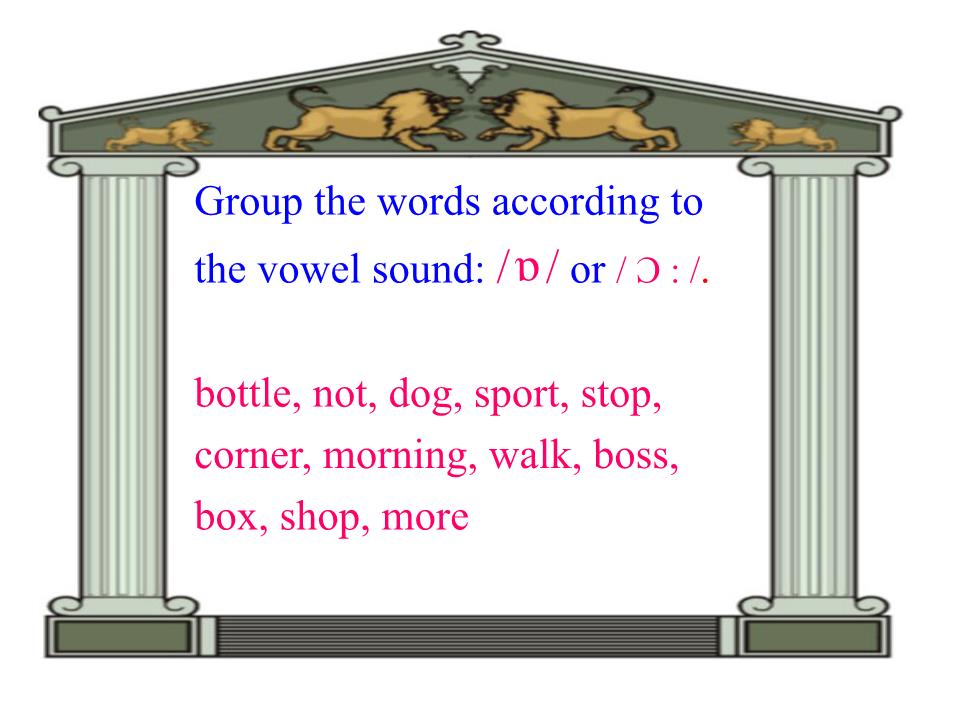
Trang 3
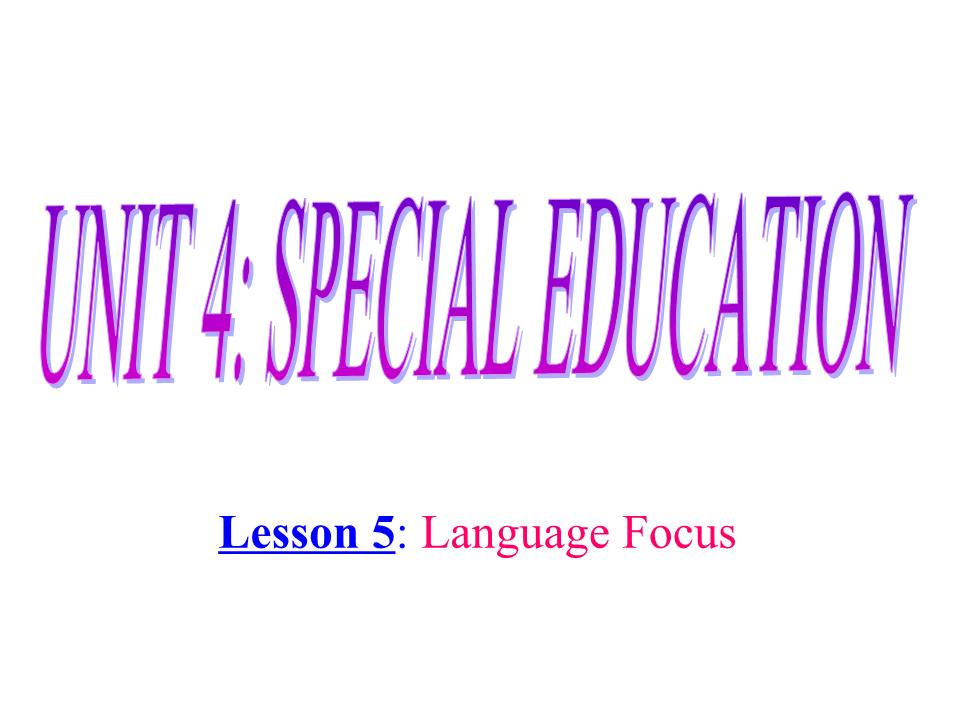
Trang 4
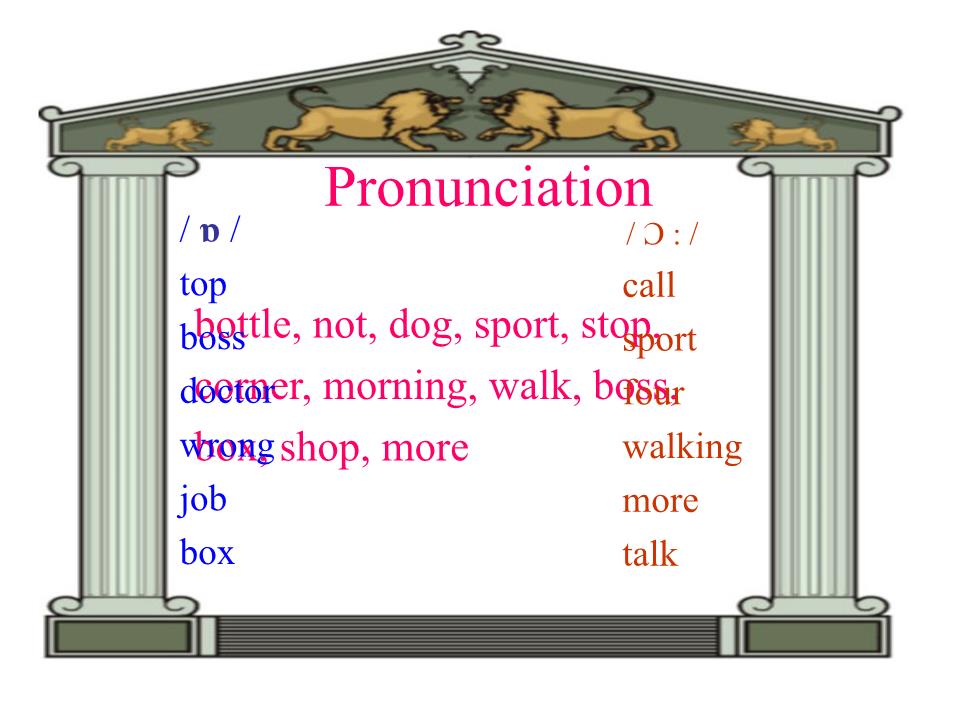
Trang 5
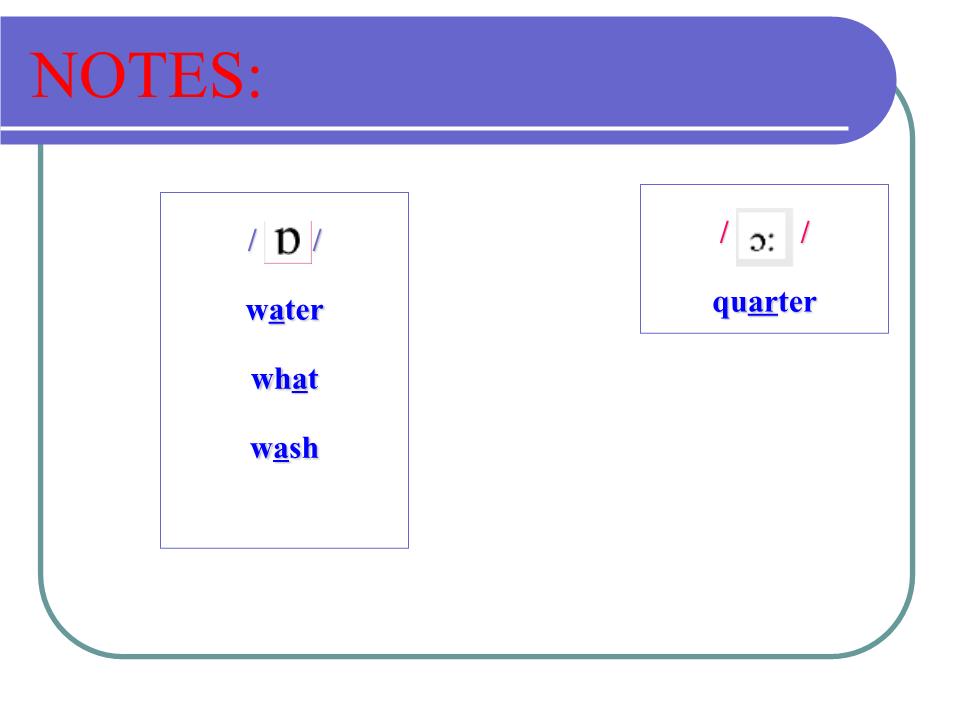
Trang 6
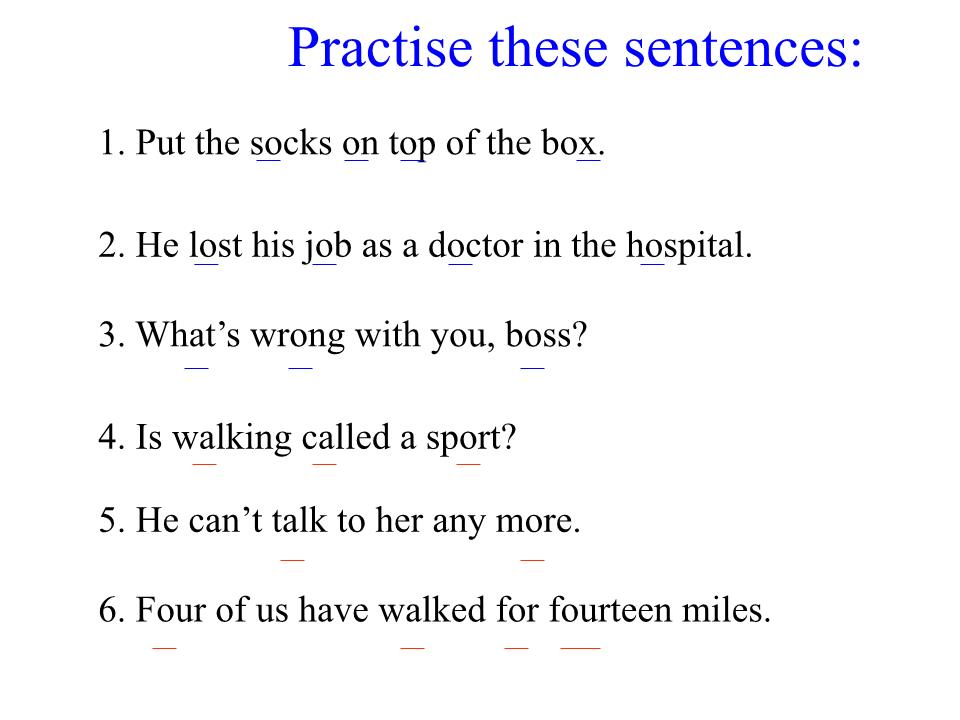
Trang 7
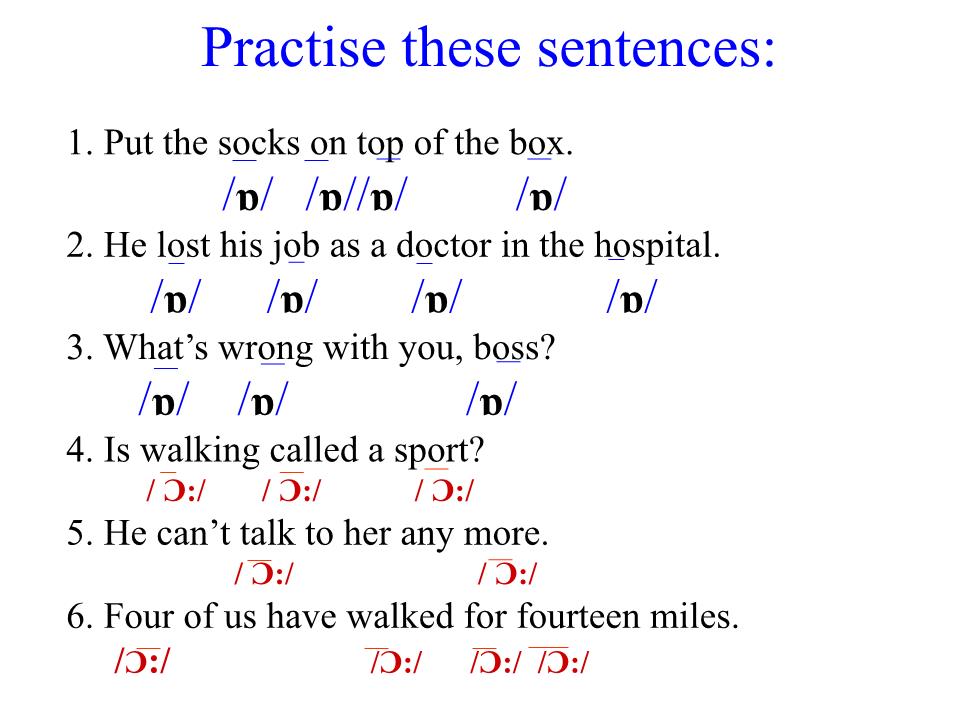
Trang 8

Trang 9
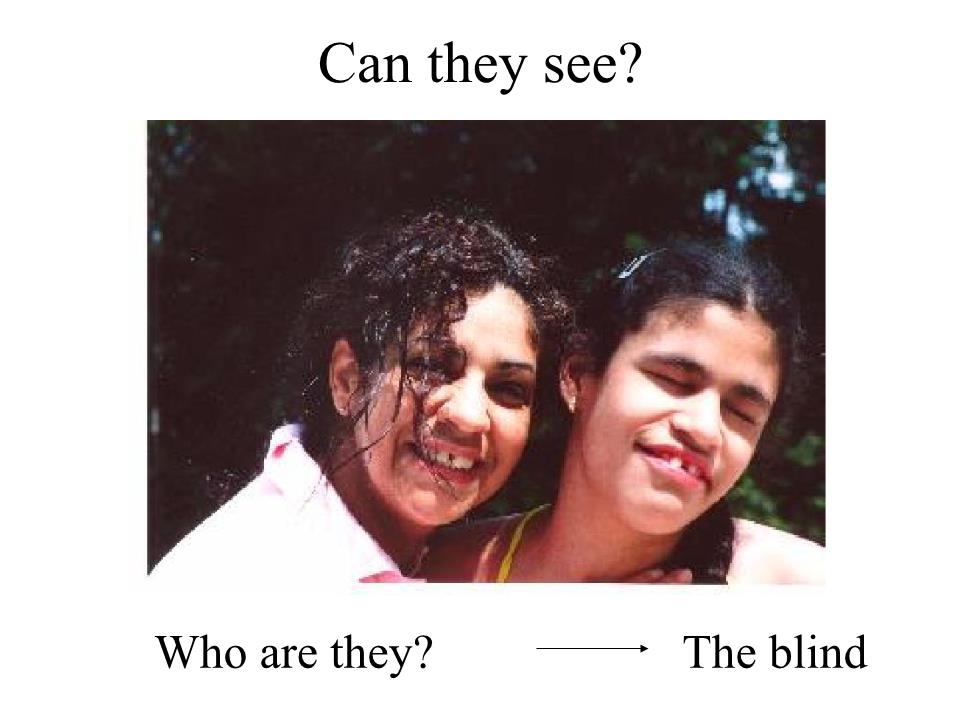
Trang 10
Tải về để xem bản đầy đủ
Bạn đang xem 10 trang mẫu của tài liệu "Bài giảng môn Tiếng Anh Lớp 10 - Unit 4: Special education - Lesson 5: Language focus", để tải tài liệu gốc về máy hãy click vào nút Download ở trên
Tóm tắt nội dung tài liệu: Bài giảng môn Tiếng Anh Lớp 10 - Unit 4: Special education - Lesson 5: Language focus

BÀI GIẢNG ĐIỆN TỬ MÔN: TIẾNG ANH 10 Language Focus UNIT 4: SPECIAL EDUCATION IDENTIFY THE SOUNDS GAME Group the words according to the vowel sound: / / or / Ɔ : / . bottle, not, dog, sport, stop, corner, morning, walk, boss, box, shop, more ɒ UNIT 4: SPECIAL EDUCATION Lesson 5 : Language Focus bottle, not, dog, sport, stop, corner, morning, walk, boss, box, shop, more / ɒ / top boss doctor wrong job box / Ɔ : / call sport four walking more talk Pronunciation NOTES: / / w a ter wh a t w a sh / / qu ar ter Practise these sentences: 1. Put the socks on top of the box. 2. He lost his job as a doctor in the hospital. 3. What’s wrong with you, boss? 4. Is walking called a sport? 5. He can’t talk to her any more. 6. Four of us have walked for fourteen miles. Practise these sentences: 1. Put the socks on top of the box. / ɒ / / ɒ // ɒ / / ɒ / 2. He lost his job as a doctor in the hospital. / ɒ / / ɒ / / ɒ / / ɒ / 3. What’s wrong with you, boss? / ɒ / / ɒ / / ɒ / 4. Is walking called a sport? / Ɔ:/ / Ɔ:/ / Ɔ:/ 5. He can’t talk to her any more. / Ɔ:/ / Ɔ:/ 6. Four of us have walked for fourteen miles. / Ɔ :/ /Ɔ:/ /Ɔ:/ /Ɔ:/ GRAMMAR Can they see? The blind Who are they? Can they hear? The deaf 1.The + adjective = plural noun Ex: the poor, the rich, the sick Exercise 1: complete sentences using the + adjective (textbook, page 52) Complete these sentences using “The + one of the adjectives”: injured, poor, rich, sick, unemployed, young 1) The young have the future in their hands. 2) Ambulances arrived at the scene of the accident and took to hospital. 3) Life is all right if you have a job, but things are not so easy for. 4) Julia has been a nurse all her life. She has spent her life caring for . 5) In England there is an old story about a man called Robin Hood. It is said that he robbed .and gave the money to. the injured the unemployed the sick the rich the poor He often smoked a few years ago. Now he stops smoking/doesn’t smoke any more . He used to smoke Form : (+) S + used to + V. inf . + O Ex: I used to cry when I was a baby . (-) S + didn’t + use to + V. inf . + O Ex: She didn’t use to go to school on foot . (?) Did + S + use to + V. inf. + O ? Yes, S + did. / No, S + didn’t. Ex: Did you use to eat cakes when you were a child? - Yes , I did . Use : To express a past habit and state. 2. Used to + infinitive Complete the sentence with used to + a suitable verb : 1. Liz .... a motorbike, but last year she sold it and bought a car. 2. Jim.. my best friend but we aren’t friends any longer. 3. We came to live in Manchester a few years ago. We...........................in Nottingham. 4. When you lived in London,you. to the theatre? 5. Janeice cream when she was a child, but now she rarely eats it. used to live used to be used to have / used to ride did you use to go used to eat YOU PASSED THE EXAM. CONGRATULATIONS ! IT IS GOOD NEWS. Hoa doesn’t get good mark, which is a pity. Hoa doesn’t get good mark. This (it) is a pity. Which = this / it “Which” is used as a connector Exercise 3 – (textbook- page 53) Exercise 3: Join a sentence from A with one from B to make a new sentence. Use “which”. A B Sheila couldn’t come to the party. Jill isn’t on the phone. Neil has passed his examinations. Our flight was delayed. Ann offered to put me up for the night. The street I live in is very noisy at night. Our car has broken down. This was very nice of her. This means we can’t go away tomorrow. This makes it difficult to contact her. This makes it difficult to sleep. This was a pity . This is good news. This meant we had to wait for hours at the airport. Example: Sheila couldn’t come to the party, which was a pity Exercise 3: Join a sentence from A with one from B to make a new sentence. Use “which”. A B Sheila couldn’t come to the party. Jill isn’t on the phone. Neil has passed his examinations. Our flight was delayed. Ann offered to put me up for the night. The street I live in is very noisy at night. Our car has broken down. This was very nice of her. This means we can’t go away tomorrow. This makes it difficult to contact her. This makes it difficult to sleep. This was a pity . This is a good news. This meant we had to wait for hours at the airport. Jill isn’t on the phone, which makes it difficult to contact her . Exercise 3: Join a sentence from A with one from B to make a new sentence. Use “which”. A B Sheila couldn’t come to the party. Jill isn’t on the phone. Neil has passed his examinations. Our flight was delayed. Ann offered to put me up for the night. The street I live in is very noisy at night. Our car has broken down. This was very nice of her. This means w
File đính kèm:
 bai_giang_mon_tieng_anh_lop_10_unit_4_special_education_less.ppt
bai_giang_mon_tieng_anh_lop_10_unit_4_special_education_less.ppt

